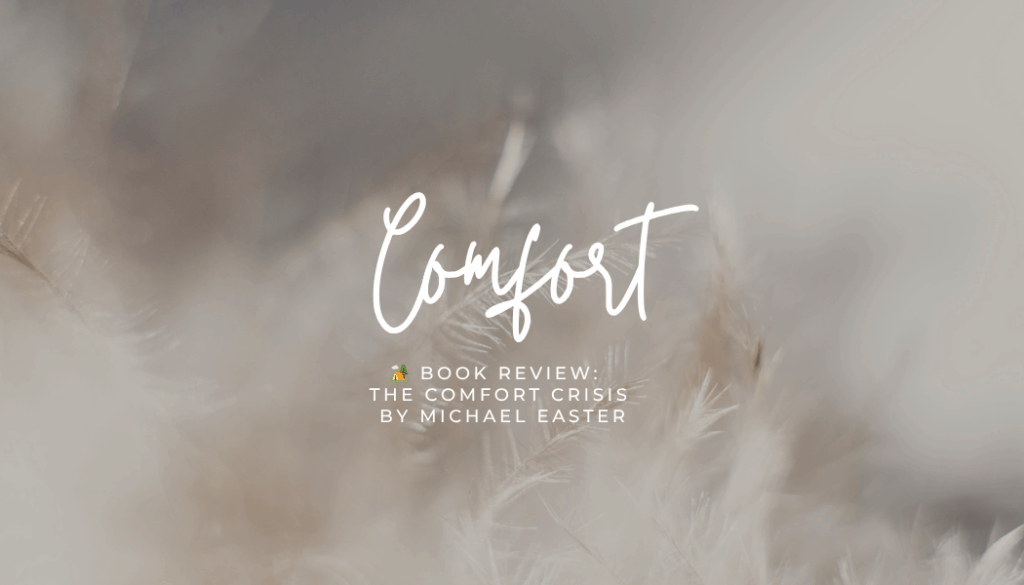Why Discomfort Might Be the Key to a Stronger, Healthier, More Purposeful Life
We live in the most comfortable era in human history—plush couches, food on demand, climate control, entertainment at our fingertips. And yet, stress, anxiety, obesity, and burnout are skyrocketing.
Michael Easter, in his eye-opening book The Comfort Crisis, argues that modern comfort is quietly killing us—and the cure lies in strategic discomfort.
This is not a self-help book with fluffy affirmations. It’s a blend of science, adventure, and tough love, based on Easter’s 33-day backcountry expedition in the Alaskan Arctic and interviews with psychologists, Navy SEALs, scientists, and monks.
🌡️ The Core Premise
“You are tougher than you think. But comfort is robbing you of the chance to prove it.”
Easter explores how voluntary discomfort—from cold exposure and silence to hunger and physical exertion—can lead to:
- Greater mental toughness
- Better health and resilience
- More fulfillment and clarity
- Reduced anxiety and addiction to digital stimulation
🧗♂️ What’s in the Book?
1. Misogi: The Modern Rite of Passage
A central concept in the book is Misogi, a once-a-year physical and mental challenge that pushes you to the edge of your limits. The rules:
- It should have a 50/50 chance of success
- It should be weird or different
- It should be outside your comfort zone in every way
This isn’t about competition or tracking metrics—it’s about growth through doing something hard for the sake of being hard.
2. The 2% Rule
When you feel like you’re at 100%—you’ve got nothing left—you’re likely only 2% into your actual potential. Easter highlights how most of us quit far too early, not from physical limitation but psychological discomfort.
3. Boredom & Stillness
Easter also examines our addiction to stimulation. Constant phone-checking and media consumption keep us from real thought, reflection, or even boredom—which is essential for creativity and self-awareness.
4. Environment vs. Genetics
We often blame genetics for our physical and mental struggles. But Easter argues that our cushy modern environment—not our DNA—is what’s weakening us. We don’t need to live like cavemen, but we do need to reintroduce challenge into our lives.
💡 Key Lessons
- Discomfort is where growth lives – Avoiding it leads to stagnation.
- You don’t need more motivation—you need exposure to difficult things.
- Challenge improves your capacity to handle everyday stress.
- You were built to do hard things. Your ancestors didn’t have another option.
🧘♂️ Real-World Ways to Apply The Comfort Crisis
Here are small but powerful ways to embrace discomfort:
- Walk or hike in extreme weather—rain, cold, heat.
- Take cold showers.
- Do hard workouts you don’t want to do.
- Go on a multi-day digital detox.
- Try intermittent fasting.
- Sit with boredom—no phone, no book, just stillness.
- Take on a “Misogi” challenge once a year.
✍️ Final Thoughts
The Comfort Crisis is a wake-up call in a soft world. It doesn’t shame you for enjoying modern life—but it asks you to balance comfort with challenge, convenience with effort.
If you’re feeling stuck, anxious, disconnected, or weaker than you want to be—maybe you don’t need more ease. Maybe you need a little hardship. This book will give you the tools—and the inspiration—to go find it.
Have you ever done something that truly tested you? What was your Misogi moment? Share it in the comments—let’s inspire each other to go beyond the bubble of comfort.
